Make it quick..
So you’re loving life in Australia and want to stay for another year? In order to be granted a second-year visa, you will need to complete 88 days of specified work in a regional area - so here are all your questions answered to complete 88 days of farm work on the 417 working holiday maker visa.
What does the specified work include for the 417 working holiday maker visa?
The specific work includes jobs like forestry, mining, solar farms, fishing and some construction but the most popular option by far is plant cultivation, such as fruit picking/packing.
Mining jobs are extremely popular since many of the backpackers got themselves to WA during the pandemic. Mining jobs can be a great way to complete your 88 days of farmwork and make a lot of money, however it may take you longer as the hours are usually 2 weeks on, 1 week off. This would mean you do more hours per week but would only be eligible to count 14 days every 3 weeks. Additionally, the best location to find FIFO work currently is Perth with a small range of jobs in SA and Queensland - check out this helpful guide for more information on this.
88 days or 176 days of Farmwork
We started our 88 days of farmwork just 3 weeks into our time in Australia back in 2018. It meant we could get it out of the way at the start and never have to think about it again - or so we thought! We loved that we made this decision, as we were able to just concentrate on fun things for the rest of our first year in Oz but it’s all good if you do it at another stage, it just needs to be completed before your first-year visa is up, so make sure you give yourself time.
Australia now offers working holiday makers the opportunity to extend their working holiday visa for the third year, so long as you are willing to work a further 6 months in a 'specified job'. When this was first declared as an option, we were roadtripping WA and it honestly sounded like our worst nightmare! Why on earth would we want to do 88 days of farmwork again, TWICE? However, like many, we fell in love with Australia. We loved the opportunity to make a lot of money, in an environment where we could save easily and we also got to work together too. We've now been in Australia for 4 years and have spent about 2 years of that doing farmwork, the other half we lived in Sydney and have travelled a LOT.
Farmwork isn't for everyone, especially if you are unfortunate enough to get a bad one at the beginning (like us, the piece rate wasn't easy!). So we're here to help you find the best 88 days farmwork jobs, get paid well and make lots of money doing it!
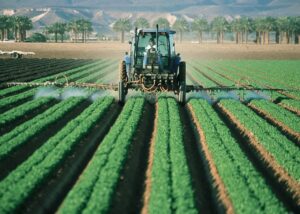
"How much time do I need to complete 88 days of farm work?"
Always give yourself more than 88 days to complete it.
Farm work is unpredictable. Sometimes the work can stop due to weather conditions or the season can end prematurely. It took us 4 months to complete ours and we know people who have taken much longer.
Looking for farm work can be quite daunting, as there are a lot of horror stories out there so we’re here to help that process be a little less scary and confusing. We had a sound experience throughout our farm work, albeit sometimes making little money but we came away with no poisonous bites, no horror stories and we regularly got a sausage sizzle on the farms too!
"How to calculate 88 days of farmwork Australia"
It can get confusing trying to work out exactly what counts as 88 days. The official immigration website states the following:
To meet the three months specified work requirement you must actually work for the same number of days that a full-time employee would normally work in a three month (88 calendar day) period. You can do this in a variety of ways, for example:
working five days a week for a continuous period of three calendar months, including on a piecework rate agreement; or
working less than five days a week over a period longer than three calendar months, including on a piecework rate agreement;
working multiple short periods of work in any combination of full time, part time or piecework rate, which add up to the equivalent of five days a week over three calendar months.
So the best way to calculate your 88 days of farmwork, is to work full time at a minimum of 38 hours a week. This enables you to count 7 days towards your 88 days farmwork. However, if you work less than 38 hours a week, you can only count the number of full-time 7.6-hour days that you actually worked. There are some helpful apps which can calculate the days for you too, such as 88 days.
You also don’t have to do the 88 days straight, they can be split up however you like and with as many farms as you like. We personally, ge4t a little bored after 2 months. So it keeps things interesting if you switch it up. Of course, if you find a great farm, stick around! We stayed on a farm for 6 months during covid.

"How to prove 88 days of farmwork"
To prove the 88 days of farmwork, you will need to input the number of days you've worked for each job with exact start and end dates. As well as attaching your employment contracts and payslips for each job too. Personally, we simply added a few of the payslips from each job which showed full-time hours.
We are aware that British citizens do seem to get let off pretty easy with the application process, and some of our friends from South America and Europe are often asked for more information if they haven't attached every single week of work. Something to keep in mind, depending on where you are from.
You could also apply for your second or third-year working holiday visa without doing farmwork. It is possible that it will get granted and you could stay here for three years without doing any farmwork. However, we've also heard of people not getting granted their visa and then the opportunity to stay for a second or third year is gone. It's a big risk that some are willing to take!
"What will I get paid for doing my 88 days of farm work?"
There are two main ways to get paid when doing 88 days of farm work.
Piece Rate
This means that you will be paid according to the quantity that you pick/pack. Sometimes it is done by weight and sometimes by units, such as trays filled. The Australia Government have now made it essential that all workers must still receive the national minimum wage regardless of piece rate, which is a fantastic opportunity for new working holiday makers. We worked on a piece rate basis and made about $30 a day most days!
Update for 2022:
There are some jobs available that still offer a piece rate of say, $35 bucket, however, they will still need to pay the minimum hourly wage. We assume this allows the incentive for fast pickers to stick around and get a higher hourly rate, if they are able to pick that fast!
Hourly
Hourly paid farm work will do what it says on the tin and pay you for how many hours you’ve worked rather than the amount you’ve picked/packed. The casual pay rate is around $26.73/hour. We found hourly farmwork hard to find when we started our farmwork journey in 2018. Since then, we've found it pretty easy to find hourly paid work, especially owning a car.
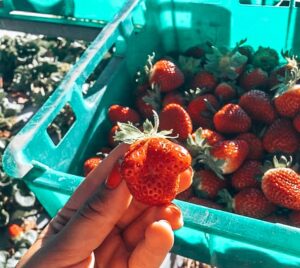
"What’s better, picking or packing?"
So there are two main roles when it comes to backpackers doing their farm work. Either picking or packing. Picking means that you will be out on the field doing the manual labour of picking the fruit/veg. Packing will usually involve being inside a shed, checking the fruits of the pickers labour for any bruises etc and then packing it, ready to send off.
Australia is a bit behind when it comes to stereotypes, so girls are more likely to end up in the shed so that guys can use their ‘Braun’ to do the harder work outside.
When it comes to which one is better, this is down to personal preference but personally, work-wise we preferred picking as it was nice to have the fresh air, feeling yourself getting stronger and fitter as time went by was good and you can usually work whilst listening to music or podcasts. Shed work was boring to us, standing on one spot for hours doing repetitive work and we weren’t allowed to listen to music as attention needed to be paid to the shed machinery. Moneywise though shed work is usually more continuous and can be less affected by weather, so it can get your days down quicker!
Harvest Trail is really helpful to see what is in season in each state throughout the year.

"What should I pick/pack?"
Pretty much everything grows in Australia so you have plenty of options. There’s everything from bananas and strawberries to onions and tomatoes but what type of farm work you will do will depend a lot on the season.
"Where is good for farm work in Australia?"
Again, this will rely heavily on what is in season. However, also be aware that the farm work has to be completed in specific postal areas. You can find a list of the eligible postcodes here. All of South Australia, Northern Territory and Tasmania count as regional Australia. We personally loved working in South Australia, Victoria and Far North Queensland - you can read more about our experience below.

"How do I find farm work that counts towards my 88 days?"
There are a few different ways you can hunt for farm work:
For us, Facebook was a huge help when it came to job hunting. There are a few Facebook groups dedicated to helping backpackers find farm work, where different vacancies are posted each day if you just search ‘farm work Australia’. ‘Backpacker Jobs in Australia’ and 'AUSTRALIA Backpackers Info' are our favourites to join for job listings and regularly updated Oz advice too.
Once you have an idea of where you want to head, you can also search for groups specific to that area and there’s usually a lot of chat about what jobs are available or any rooms to rent etc. Australians love a local area page, we've had great success finding places to live, things to do in the area and farmwork in these groups!
Backpacker Job Board
This is a website for backpacker jobs in Australia in general, although we find that it’s not very helpful for jobs outside of the farm work realm. However, there are always a good few postings for farm work on here so definitely worth checking.
Gumtree
A lot of farms don’t bother with Facebook or job search engines so Gumtree can sometimes be your best bet to see jobs you won’t see elsewhere. It’s also a great place to place a post saying that you are seeking farm work with a description of yourself and what you’re looking for and some farmers may contact you. We haven't had the best luck with Gumtree, we've found it can get pretty spammy honestly. We would advise approaching this with caution!
Google Search
Some farms don’t bother with anything online at all so then it is worth choosing an area and searching for farms on Google Maps. You can then get their contact details and be able to call around to see if any of them have vacancies.
If you have an idea in mind, it can be really helpful to search that location on Instagram to be able to see who is there working at the moment. You can then send people messages to get an idea of what the work situation is in that area. If you don’t have a clue where you want to head, it can also be helpful to search for the hashtags #88days or #88daysaslave. From here, you can see where everyone is posting from, get an idea of the most popular areas and send some messages around for advice.
Ask Around
We’re all in the same boat so whenever you’re at a hostel or anywhere else with plenty of backpackers around, just ask around to find out about others' experiences or you might find people who are about to head off to do their farm work and you could tag along!
Find a Working Hostel
Working hostels are hostels specially located in popular farm work areas. They provide you with somewhere to stay whilst you do your farm work and also help to find work for you. They are great for meeting new people and are probably the most fun way to do your 88 days. However, this comes at quite a heavy price as they are very expensive for what they are. Always make sure you check out reviews too, as some have bad reputations and are known for saying they have work for you but then that changes once you arrive.
Drive Around
Having a car is a huge advantage when it comes to finding farm work. There are quite a lot of farms that only accept workers who have a car. Once you’ve got an area in mind, they are also great for just being able to drive around and visit farms in person to see if there are any jobs available. Having a car also means that you are less likely to have to rely on a working hostel.

"What about all these farm work horror stories?"
There are some horror stories about crazy farmers, hostels and farm work scams and it can make it very daunting to look for work, trying to avoid your own horror story.
If you’re careful you should be OK but here are some things to look out for:
Don't be fooled by a sweet deal
Do be aware that when it comes to Facebook, Job Search Engines and Gumtree, there are some scams out there. If it sounds too good to be true, it probably is. Always check out reviews and try to contact the farm directly to check if it’s legit before you head off somewhere.
Don't pay upfront
A lot of these fake job listings will say that an upfront fee is required, there’s free accommodation, ‘guaranteed’ jobs or will post the wrong produce for the wrong season so be sure to cross-check it with the seasonal produce guide here. 99.9% of the time you should not have to pay any upfront fees to get farm work or have anyone help you find it. Free accommodation in a hostel/hotel is most likely to be a lie but it should be noted that some farms do offer free camping facilities or free basic accommodation.
Check the address
Look out for advertisements that only provide a post office box contact address (no street address) or any agency that guarantees you a quick visa or sponsored employment to work in Australia.
Don’t rely on an ABN check.
Scammers have been known to hijack legitimate ABN numbers.
If you are 100% sure that for some reason, sending money is required (although we highly discourage doing this), you can check their BSB number to see what bank it is connected to. If the search comes up with something like ‘Australia Post Pre-Paid Card’, reconsider. No legitimate company ever uses a "Pre-Paid" bank card in relation to hiring workers.
It's not all bad!
Don’t let these things worry you too much though! Most of it will come down to common sense and you’ll be able to sniff out a scam. Just make sure you do your research before committing to anything.
Our Experience
We had a pretty good farm work experience so below we will share exactly where and when we worked to help if you’re looking to work around the same time too.
Caboolture farm work
What? Strawberry Picking
Where? Berry Patch in Wamuran/Caboolture, Queensland
When? August - October. The season ended in October and started in June.
Caboolture is only about an hour’s train ride from Brisbane so it doesn’t feel too rural. Caboolture itself also has all the major supermarkets and a shopping centre too.
We stayed with a local family, who we found on Facebook. They had a spare car that they let us borrow whilst we stayed there too. The room had Netflix and a PS3 and a separate bathroom to the family. This cost $130/week each.
There is also the option to stay in a hostel called Caboolture Backpackers. A few people from our farm were staying here and we didn’t hear too many complaints. They provide a lift to and from the farm.
Perks? Strawberry picking on this farm was pretty easy. You’re sat in a trolley with shade and pick the strawberries as you roll through the lanes. The farmers are nice and don’t really bother you. They also did BBQs every now and again, which was nice.
Cons? The pay was piece rate and terrible unless you were super fast at picking. Fortunately, this has changed now and so strawberry picking could be a really great option! Also, If you arrive at the start of the season, you might be able to land work planting the strawberries.

Gatton farm work
Gatton is a small town further inland. It is more rural but still has major supermarkets, Target and McDonalds. There is also a public pool, which is fab on those hot Queensland days! Gatton is also close to Toowoomba, which has all the major shops and if you have a car, Brisbane is around an hours drive away (3 hours on public transport though!). This town is full of farms so there’s plenty of opportunities for work when the seasons right, especially if you have your own transport.
If you don’t have your own transport, there are a lot of contractors in the area who will pick you up from your accommodation and take you to the farm. Please contact us if you’d like some contact info for the good ones.
We stayed in a share house that we found on the ‘Gatton Backpackers’ Facebook page. There are plenty available in Gatton, ranging from around $80-110/week. We paid $80 a week, sharing with 4 other people. This included bills and WiFi.
There aren’t any hostels in Gatton itself but there are some in the surrounding areas. In Gatton, the main backpacker hub is a caravan park. The caravan park is great for socialising and if that’s your main priority, it may be worth staying there. We would advise a share house though, as the caravan park is over $100/week with no WiFi included and taking a shower comes at a fee! If you’re solo travelling, it is a good idea to stay here to meet some people and then later find a share house together.

Farmwork jobs in Gatton
We did a few jobs in Gatton so here is a summary:
Onions
What? Onion Picking
Where? Gatton, Queensland
When? October. This was nearing the end of the season though, so earlier than this would be better.
Perks? Onion picking isn’t too difficult. There’s a lot of stories of some produce being absolutely back-breaking but we didn’t find onions to be too bad. Although don’t get us wrong, it wasn’t easy either!
Cons? Again, this was piece rate so the pay wasn’t great unless you’re fast. THE SMELL. Picking onions will mean that you and your clothes will constantly stink!
This a good option again for people who want relatively easy work to get rid of their days. As there are quite a few hourly paid jobs in Gatton, this is also a good option to get your days down/make some money while you wait to secure one of the hourly paid jobs in the area.
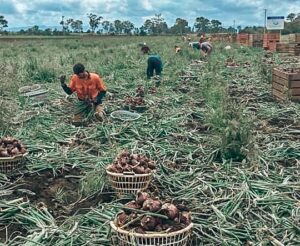
Pumpkins
What? Chipping pumpkins and carrots
Where? Gatton, Queensland
When? October - November
We got this work through a contractor. Chipping is essentially like weeding so you're getting rid of the plants growing around the produce. We would highly recommend grabbing any chipping jobs you see as this is definitely the easiest hourly work to get in the farming world. We also got hourly work in the same farm sorting the carrots in their shed but see more about shed work below.
Perks? Hourly pay and very chill.
Cons? Can’t think of any!
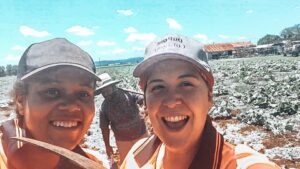
Shed work
What? Shed work. Beans, corn, broccoli.
Where? Rugby Farm. Gatton, Queensland
When? November - December
One of the main farms in Gatton is one called Rugby Farm. Rugby Farm produces veg for Australia’s largest supermarket, Coles. So you can imagine the intense operation of this farm compared to some others. To get a job at Rugby Farm, you will need to hand in your CV in person and wait for a call/text back. This time of year is a good time to apply as they do a huge recruitment session for the busy Christmas period.
Shed work is the packing stage between picking the produce and buying it in-store. It involves sorting out the good from the bad and making sure it looks ready for the public eye.
Perks? Hourly pay
Cons? Shed work is SUPER boring. Especially in the stricter farms, as you aren’t allowed to listen to music or talk. In our case, it involved standing in one spot for 10+ hours doing mind-numbing monotonous work.
This is great work for saving money. The hours are long, paid hourly and there isn’t much to spend your money on in the area. Just beware, you may feel your brain melting away!
Other areas good for shed work
Nyah West - Victoria
What? Shed work. Carrots, Broccoli, Beetroot, Celery
Where? Arahura Farms. Nyah West, Victoria
When? September - March
A great place for shed work during Spring/Summer. The caravan park is full of backpackers with a budget-friendly weekly charge of $80 which includes shower facilities, electricity and kitchen space.
The manager there works with all the main farms in the area and most are super friendly, fun places to work with hourly pay. Arahura farms were sadly the worst of the bunch!
Perks? Hourly pay. Friday nights at the local pub were also great fun! Plenty of backpackers hang out in the backyard with an AUX cable for music and some basic disco lights too. There was also a courtesy bus from the caravan park too.
Cons? The work is very seasonal with little to no work from February to September.
Dairy farms - Victoria
What? Milking cows
Where? Cobden, Victoria
When? All year round
We never thought we'd ever work on a dairy farm, but the Corona Virus pandemic gave us no option but to find farm work during the winter months in Victoria. It's too cold for fruit and veg to grow in Victoria but there are plenty of dairy farms, particularly around the regional areas near the Great Ocean Road.
Perks? Hourly pay. Guaranteed work come rain or shine! Most farms offer on-site accommodation. Milking happens twice a day, in the morning and evening. So you get most of the day to yourself!
Cons? We've seen that some dairy farms can start really early in the morning, like 2 am early... Our farm started at 5:45 am, however. It can be quite rural, we didn't have many close amenities and often had bad phone signal too.
Plant Nurseries - Far North Queensland
What? Looking after plants being sold to Bunnings
Where? Mareeba, Queensland
When? All year round
We enjoyed our time working in a plant nursery, although we were fortunate to work predominantly on the detailing table. Essentially, we became plant hairdressers, primming and correcting any straggly leaves and sticking labels on pots ready for dispatch. Some jobs at the farm weren't so easy!
Perks? Working with pretty flowers all day, in the beautiful Queensland sun! We also got to bring our speaker to work and listen to music all day! Sometimes we got to get on the Quad/ATV collecting plants for detailing which was pretty fun!
Cons? Some jobs on the nursery were tough, as the plants grow they need to be moved around the green houses. This means bending down picking up two pots at a time and moving them to a new location. Honestly, it's back breaking after several hours!
Our Favourite Farmwork to Complete 88 days farmwork Australia
POTATOES!
We landed a job working on a potato farm in Victoria at the very beginning of the Pandemic. We've since worked on two other potato farms and have even found other potato harvesting jobs across the country in almost every state! Let us explain why we like it so much...
What? Grading potatoes
Where? Adelaide - Virginia Farms, Mittolo Farms & South Australia Potato Company (to name a few!).
When? All Year Round
This is our favourite farm work in Australia, it usually involves being in the field grading potatoes as they come up through the harvester. You are essentially sitting in a moving greenhouse on the back of a tractor. As you dig each row, it also means you get a little break when the harvester turns around to start a new row. It certainly feels less boring than shed work even though it’s the same principle.
Virginia Farms is probably one of our favourite farm work experiences, at Christmas, they dig in nearby areas so our time was mixed between harvesting and shed work. If you choose to complete your farmwork outside of the Christmas period, they dig in an area called Kangaringa which is extremely remote. We would advise doing the shed work in Virginia or if you enjoy being completely off-grid, give Kangaringa a try. During the pandemic, they offered free accommodation, maybe mention it if they don’t, as they might honour it!
Perks? It was great being just 30 mins from Adelaide CBD and the work was perfect to help us save. We were on a part-time contract which allowed us to reap the benefits of overtime, sick leave and holidays. We also got to listen to music on the harvester too!
Cons? The hours can be extremely long, with early starts and late finishes. Also, Virginia Farms pack onions most of the year which is a horrible job to clean up after with all the onion skins!
Where to farm potatoes in Victoria
Where? Ballarat Region, Victoria
When? March - June, sometimes longer
The Potato farming jobs in this region are much smaller than those we’ve experienced in Adelaide. We found both our jobs on Facebook jobs boards and on both occasions we were a small team of 4. There are plenty of potato jobs in the region but they are harder to find. Feel free to reach out to us if you’d like us to find out if there’s any availability at our old jobs.
Perks? Easy work on the back of the harvester and some grading in the shed.
Cons? South Australia and Victoria get cold in the winter and don't really warm up until October, it certainly isn’t the sunny Australian Dream!
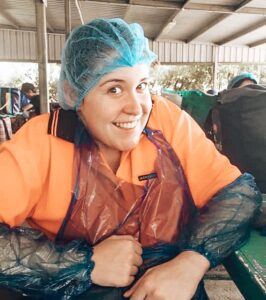
Pin it!
You may also like...
- Having a working holiday visa in Australia - Everything you need to know!
- A Complete Guide to Sydney
- 12 Free Things to do in Darwin
- A Complete Guide to Melbourne
- Our Ultimate Guide to Perth
- 10 things to see & do in Broome
- Country Towns Near Melbourne - You need to Visit!
- The Best Stops from Perth to Darwin
- Road Trip South West Australia - the incredible Esperance!
- Our full guide to Adelaide Fringe - The second biggest Fringe Festival after Edinburgh!
- The Spectacular Lap of Tasmania
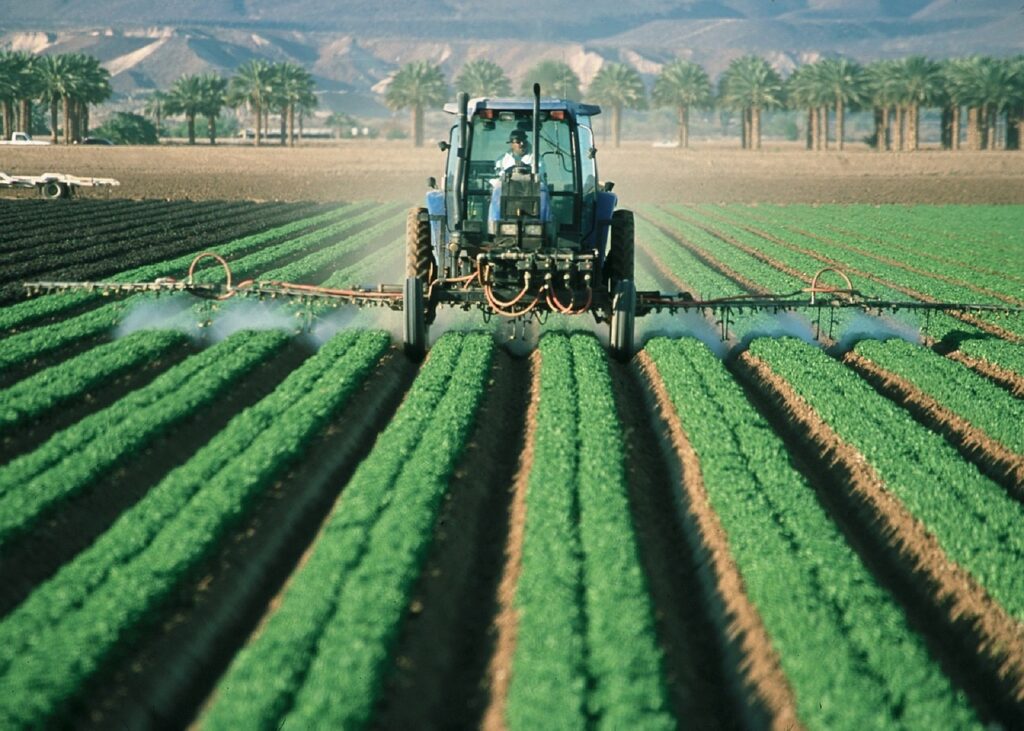
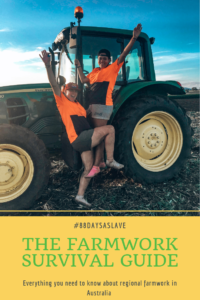
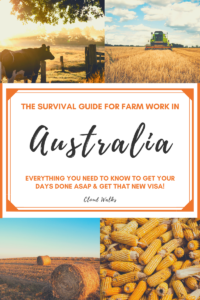

Pingback: Australia - Having a Working Holiday Visa in Australia - Cloud Walks
Hello,
do you know if in the first year of visa I worked more than 3 months In farm, is it counting for the second year farm days to get the third year?
Hi Bat
Sadly not, you need to do the 6 months farmwork within your second year to count towards your third.
Hope this helps! 🙂
Hi, I’m currently working in dalwallinu, it’s for a concrete company but I am doing welding as my jobs role. I know it says manufacturing concrete and steel does not count. But I am doing welding does this matter? The postcode is 6609.
Hi Kori
I wouldn’t be able to give you definite advice on this. I would imagine if your original job offer states you to be employed as a welder this would be enough to prove your position at the company. Alternatively, The facebook group ‘Australian Backpackers Info’ are really good at offering advice on individual circumstances. IF you’d like more confirmation on the best steps. Thanks for reaching out. Sarah
Hi!
I’m currently working in construction in regional VIC. However the address of where I am working doesn’t appear on my payslips (only the head office address is shown and this is in Melbourne). How can I prove that I am working in rural VIC?
Hi Miriam
I believe putting your work address down will suffice. So long as they could contact the business and confirm the rural address this will be enough. We don’t work for the Australian Immi department so we can’t guarantee this will work but if you’d like to ask the ‘Australia backpackers info’ facebook group. Those guys are super helpful with individual and unique issues regarding WHV etc. I hope this helps! Thanks for reaching out. Sarah
Hi Sarah,
Hoping you can help, if I was to get two jobs and work part time at both over the same 88day period would this also be a viable option, I have two small farms willing to spread the employment but can’t take me full time individually
Many thanks
Teresa
Hi Teresa
Sorry I did not see this earlier, this would be fine. As long as the weeks hours amount to full time hours you would be able to provide this evidence.
Thanks for getting in touch!
Hello! i have a question about the sick days, i’m currently working in a dairy farm in NSW and i was sick for a few days because of the work and my employee doesn’t want to pay me for these days so the question is, legally what i can do? Must they have to pay me these days or not?
Hey!
Unfortunately, if you are on a casual contract, your employer does not have to pay you for your sick days as the ‘casual loading’ increases your wage above that of the minimum wage to offset any sick pay.
The best bet is to work a few extra days to ensure you have the 88days covered.
Hope this helps!
Thanks for getting in touch 🙂
Hello! i have a question about the sick days, i’m currently working in a dairy farm in NSW and i was sick for a few days because of the work and my employee doesn’t want to pay me for these days so the question is, legally what i can do? Must they have to pay me these days or not? Thnaks a lot!
I am agraduated Becholor of Education (B.Ed)in Government of Myanmar ,and a staff of the township offfice in Kalay Town under the Departhment of Education Ministry. I want to go as 88 Days of farm Worker in Australia my vocational time. Please, contact for me to visist as 88 Days farms Job Agents.